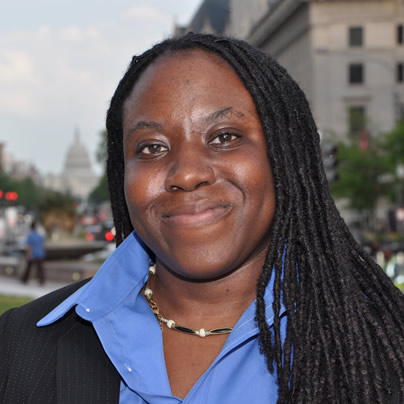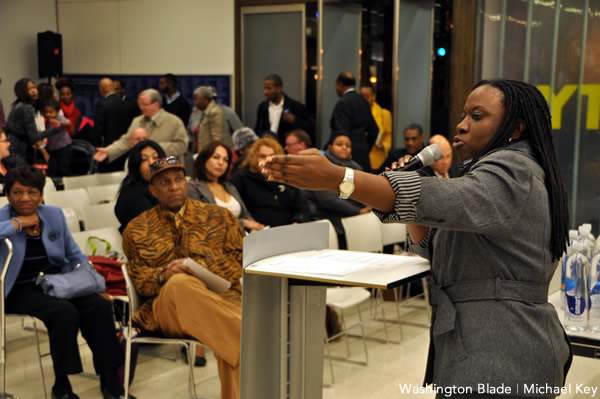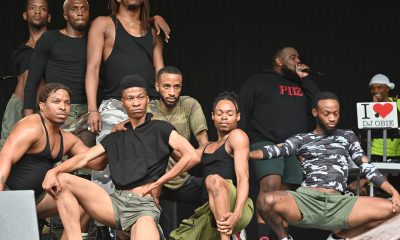Local
Stein Club president withdraws from consideration for new club election
Special meeting on Wednesday to consider invaliding Dec. 3 election of new slate of officers


A Gertrude Stein Democratic Club endorsements meeting from October of this year, prior to the leadership shake-up. (Washington Blade file photo by Michael Key)
Lateefah Williams, the president of the Gertrude Stein Democratic Club who lost her race for a second term in the club’s Dec. 3 election, announced on Sunday that she won’t be a candidate if the club decides to invalidate the balloting for her seat and calls a new election.
Her announcement comes in the wake of an uproar among many of the club’s longtime members over the successful campaign by three young activists who won control of the club by defeating Williams and two vice presidential candidates running on Williams’ slate.
Gay political consultant Martin Garcia, 27, who beat Williams by a vote of 47 to 45, is credited with playing the lead role in organizing the upset victory by arranging for at least 46 mostly young LGBT activists to join the club less than a week before the election and vote for him and his vice presidential running mates.
Angela Peoples, 26, a policy analyst for the U.S. Consumer Financial protection Bureau, and Vincent Villano, 26, communications director for the National Center for Transgender Equality, won the two vice presidential seats on Garcia’s slate.
Club treasurer Barrie Daneker and club secretary Jimmie Luthuli were not challenged by Garcia’s backers and won re-election unopposed. But in winning three of the club’s five officer’s positions, Garcia, Peoples, and Villano were expected to gain control of the club when they take office Jan. 1.
Last week, several longtime members, including transgender activist Jeri Hughes, called for an official challenge to Garcia, Peoples, and Villano’s election. The club’s existing officers responded by calling a special meeting for Dec. 19 to decide whether the election should be invalidated based on the challenges.
Daneker, who is in charge of maintaining the club membership list, said a review of the online application forms for 17 of the new members raised questions about whether some qualified for a lower priced special membership category.
Daneker said the review of the application forms also indicated some of the new members did not submit a valid home address, which could be a violation of club rules.
Those challenging the election say the election should be invalidated if the club determines some of the new members should be disqualified due to membership “irregularities” and the number of disqualified members exceeds the margin of victory of Garcia, Peoples, and Villano. All three won by a margin of between two and seven votes.
The longtime members who called for the special meeting, which is to decide whether the election should be upheld or invalidated, are believed to be supporters of Williams and her slate of officers who lost the election.
Williams announced her withdrawal from consideration for retaining her seat after her current term expires on Dec. 31 in an open letter sent by email on Sunday to the club’s membership.
“While I am deeply humbled and profoundly grateful for the support of these longtime members and I believe that it is important to investigate potential election irregularities, I am also very concerned about the future of the club,” Williams said in her Dec. 16 email.
“It is imperative that the Stein Club move forward into the future as a unified organization, so that we may continue to focus on effectively advocating for the District’s LGBT community,” she said. “To that end, I am removing myself from consideration as the 2013 Stein Club president.”
Williams noted that she recused herself from the vote by the club’s officers, who make up the group’s executive board, to call the special meeting.
“While the decision to hold the special meeting and to possibly invalidate the election results is, and always has been, a different matter than my candidacy, I want to state my intentions unequivocally, so that it’s clear that any decision that is made by the membership at the special meeting should be made independent of me,” Williams said in her email.
Daneker said the club had a total of 190 members prior to the effort by Garcia and his supporters to recruit new members. According to Daneker, 46 new members, including Garcia, Peoples, and Villano, who had not appeared on the club’s membership rolls before, joined the club in the week prior to the Dec. 3 club election.
Although some of the new members have said their recruitment effort doubled the club’s membership, Daneker said the new members appear to have increased the membership from 190 to 236, which is about 24 percent.
Confusion over the membership totals surfaced, Daneker said, when the balloting at the Dec. 3 election showed that a total of 92 ballots had been cast, with Garcia beating Williams by a razor-thin two vote margin. He said some people incorrectly assumed that the 92 people who voted in the election made up most or all of the membership.
When asked why he thought as many as 145 of the 190 existing members didn’t show up for the election, Daneker said, “Historically, we don’t get all the members to come to every single meeting.”
Garcia and his supporters have argued that their election recruitment effort brought in energetic new members who will reinvigorate the club.
“We are disappointed that the Stein leadership intends to challenge new members who want to contribute to Stein’s growth,” Garcia said in a statement released last week.
“These new members are young people, people of color, and people from low-income backgrounds who were otherwise not engaged in Stein’s activities…We should be having a special meeting celebrating these new members and finding ways to engage them.”
In a series of Facebook messages and a commentary in the Blade, Hughes has emerged as the lead advocate for invaliding the election and holding a new election for president and the two vice president’s seats.
An attorney who reviewed the question of whether the Stein Club election can be invalidated has said such an action could only take place if it can be shown that new members gave a false address or joined at the $15 membership rate rather than the standard $35 rate when they were not qualified or the lower rate. The $15 membership is limited under the club’s bylaws to students, senior citizens, and “limited income” members.
Hughes, while saying the issue of possible membership irregularities should be resolved, has called the election a “farce” because the new members stacked the meeting with their supporters.
“It became a farce when a group of new members – most of whom have never attended a Stein Club meeting or participated in the local issues affecting the District – attended the election night process with the sole intention of usurping the Stein Club leadership,” she said in her commentary.
“They are strangers,” she said. “By their own admission, none had been Stein Club members for more than a week.”
Not all of the club’s longstanding members agree with Hughes that the election should be challenged.
Gay Democratic activist Rick Rosendall, who won election last week as president of the Gay and Lesbian Activists Alliance, is a longtime Stein Club member.
“Jeri, they won according to the rules,” he told Hughes in a Facebook posting. “They represent the biggest influx of talent and energy into the group in a long time. Forcing them out in a special meeting which itself violates the rules is not legitimate,” he said. “Nor does it advance our cause.”
D.C. transgender activist Julius Agers, the club’s vice president for political and legislative affairs, who did not run for re-election, said he, too, considers the influx of new members to be beneficial to the club.
“Let us all strive as hard as we can to be open minded, and not let old thoughts and old prejudices and old loyalties blur our vision,” he wrote in a Facebook posting on Saturday. “These young people have earned their respect from many circles. In fact, they have done amazing things and I for one am thrilled that they are bringing their passion in our direction.”
The special meeting is scheduled for 7 p.m. Wednesday, Dec. 19, in Room 120 of the John A. Wilson D.C. city hall building at 14th Street and Pennsylvania Ave., N.W.
Maryland
Rockville teen charged with plotting school shooting after FBI finds ‘manifesto’
Alex Ye charged with threats of mass violence

BY BRETT BARROUQUERE | A Montgomery County high school student is charged with what police describe as plans to commit a school shooting.
Andrea Ye, 18, of Rockville, whose preferred name is Alex Ye, is charged with threats of mass violence. Montgomery County Police and the FBI arrested Ye Wednesday.
The rest of this article can be found on the Baltimore Banner’s website.
District of Columbia
New D.C. LGBTQ+ bar Crush set to open April 19
An ‘all-inclusive entertainment haven,’ with dance floor, roof deck

D.C.’s newest LGBTQ+ bar called Crush is scheduled to open for business at 4 p.m. on Friday, April 19, in a spacious, two-story building with a dance floor and roof deck at 2007 14th St., N.W. in one of the city’s bustling nightlife areas.
A statement released by co-owners Stephen Rutgers and Mark Rutstein earlier this year says the new bar will provide an atmosphere that blends “nostalgia with contemporary nightlife” in a building that was home to a popular music store and radio supply shop.
Rutgers said the opening comes one day after Crush received final approval of its liquor license that was transferred from the Owl Room, a bar that operated in the same building before closing Dec. 31 of last year. The official opening also comes three days after Crush hosted a pre-opening reception for family, friends, and community members on Tuesday, April 16.
Among those attending, Rutgers said, were officials with several prominent local LGBTQ organizations, including officials with the DC Center for the LGBTQ Community, which is located across the street from Crush in the city’s Reeves Center municipal building. Also attending were Japer Bowles, director of the Mayor’s Office of LGBTQ Affairs, and Salah Czapary, director of the Mayor’s Office of Nightlife and Culture.
Rutgers said Crush plans to hold a grand opening event in a few weeks after he, Rutstein and the bar’s employees become settled into their newly opened operations.
“Step into a venue where inclusivity isn’t just a promise but a vibrant reality,” a statement posted on the Crush website says. “Imagine an all-inclusive entertainment haven where diversity isn’t just celebrated, it’s embraced as the very heartbeat of our venue,” the statement says. “Welcome to a place where love knows no bounds, and the only color or preference that matters is the vibrant tapestry of humanity itself. Welcome to Crush.”
The website says Crush will be open Tuesdays and Wednesdays from 4 p.m. to 12 a.m., Thursdays from 4 p.m. to 2 a.m., Fridays from 4 p.m. to 3 a.m., Saturdays from 2 p.m. to 3 a.m., and Sundays from 2 p.m. to 12 a.m. It will be closed on Mondays.
Crush is located less than two blocks from the U Street Metro station.
District of Columbia
Reenactment of first gay rights picket at White House draws interest of tourists
LGBTQ activists carry signs from historic 1965 protest

About 30 LGBTQ activists formed a circular picket line in front of the White House Wednesday afternoon, April 17, carrying signs calling for an end to discrimination against “homosexuals” in a reenactment of the first gay rights protest at the White House that took place 59 years earlier on April 17, 1965.
Crowds of tourists looked on with interest as the activists walked back and forth in silence in front of the White House fence on Pennsylvania Avenue. Like the 1965 event, several of the men were dressed in suits and ties and the women in dresses in keeping with a 1960s era dress code policy for protests of the Mattachine Society of Washington, D.C., the city’s first gay rights group that organized the 1965 event.
Wednesday’s reenactment was organized by D.C.’s Rainbow History Project, which made it clear that the event was not intended as a protest against President Joe Biden and his administration, which the group praised as a strong supporter of LGBTQ rights.
“I think this was an amazing event,” said Vincent Slatt, the Rainbow History Project official who led efforts to put on the event. “We had twice as many that we had hoped for that came today,” he said.
“It was so great to see a reenactment and so great to see how far we’ve come,” Slatt said. “And also, the acknowledgement of what else we still need to do.”
Slatt said participants in the event who were not carrying picket signs handed out literature explaining the purpose of the event.
A flier handed out by participants noted that among the demands of the protesters at the 1965 event were to end the ban on homosexuals from working in the federal government, an end to the ban on gays serving in the military, an end to the denial of security clearances for gays, and an end of the government’s refusal to meet with the LGBTQ community.
“The other thing that I think is really, really moving is some of the gay staff inside the White House found out this was happening and came out to greet us,” Slatt said. He noted that this highlighted how much has changed since 1965, when then President Lyndon Johnson’s White House refused to respond to a letter sent to Johnson from the Mattachine Society explaining its grievances.
“So now to have gay people in the White House coming out to give us their respects and to say hello was especially meaningful to us,” Slatt said. “That was not expected today.”
Among those walking the picket line was longtime D.C. LGBTQ rights advocate Paul Kuntzler, who is the only known surviving person who was among the White House picketers at the April 1965 event. Kuntzler said he proudly carried a newly printed version of the sign at Wednesday’s reenactment event that he carried during the 1965 protest. It stated, “Fifteen Million Homosexuals Protest Federal Treatment.”
Also participating in the event was Japer Bowles, director of D.C. Mayor Muriel Bowser’s Office of LGBTQ Affairs. Bowles presented Slatt with a proclamation issued by Bowser declaring April 17, 2024, Mattachine Society Day in Washington, D.C.
“Whereas, on April 17, 1965, the Mattachine Society of Washington courageously held the nation’s inaugural picket for gay rights, a seminal moment in the ongoing struggle for LGBTQIA+ equality in the United States, marking the genesis of public demonstrations advocating for those rights and paving the way for Pride Marches and Pride celebrations worldwide,” the proclamation states.
About 30 minutes after the reenactment event began, uniformed Secret Service agents informed Slatt that due to a security issue the picketers would have to move off the sidewalk in front of the White House and resume the picketing across the street on the sidewalk in front of Lafayette Park. When asked by the Washington Blade what the security issue was about, one of the Secret Service officers said he did not have any further details other than that his superiors informed him that the White House sidewalk would have to be temporarily cleared of all people.
Participants in the event quickly resumed their picket line on the sidewalk in front of Lafayette Park for another 30 minutes or so in keeping with the 1965 picketing event, which lasted for one hour, from 4:20 p.m. to 5:20 p.m., according to Rainbow History Project’s research into the 1965 event.
Although the LGBTQ picketers continued their procession in silence, a separate protest in Lafayette Park a short distance from the LGBTQ picketers included speakers shouting through amplified speakers. The protest was against the government of Saudi Arabia and organized by a Muslim group called Al Baqee Organization.
A statement released by the Rainbow History Project says the reenactment event, among other things, was a tribute to D.C.-area lesbian rights advocate Lilli Vincenz, who participated in the 1965 White House picketing, and D.C. gay rights pioneer Frank Kameny, who founded the Mattachine Society of Washington in the early 1960s and was the lead organizer of the 1965 White House protest. Kameny died in 2011 and Vincenz died in 2023.
The picket signs carried by participants in the reenactment event, which were reproduced from the 1965 event, had these messages:
• “DISCRIMINATION Against Homosexuals is as immoral as Discrimination Against Negroes and Jews;”
• “Government Should Combat Prejudice NOT PROMOTE IT”
• “White House Refuses Replies to Our Letters, AFRAID OF US?
• “HOMOSEXUALS Died for their Country, Too”
• “First Class Citizenship for HOMOSEXUALS”
• “Sexual Preference is Irrelevant to Employment”
• “Fifteen Million U.S. Homosexuals Protest Federal Treatment”
-

 Africa4 days ago
Africa4 days agoCongolese lawmaker introduces anti-homosexuality bill
-

 District of Columbia1 day ago
District of Columbia1 day agoReenactment of first gay rights picket at White House draws interest of tourists
-

 World4 days ago
World4 days agoOut in the World: LGBTQ news from Europe and Asia
-

 Arizona1 day ago
Arizona1 day agoAriz. governor vetoes anti-transgender, Ten Commandments bill












